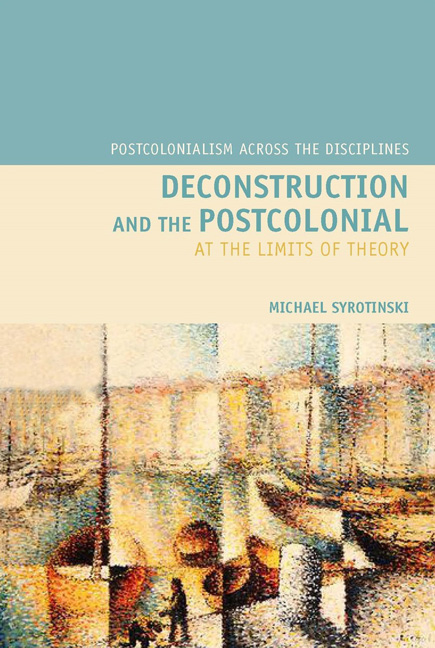Book contents
- Frontmatter
- Dedication
- Contents
- Acknowledgements
- Introduction: a few liminal remarks
- Part I Postcolonial deconstruction
- Part II Deconstruction and postcolonial Africa
- 4 Defetishizing Africa
- 5 Reprendre: Mudimbe's deconstructions
- 6 Violence and writing in the African postcolony: Achille Mbembe and Sony Labou Tansi
- Conclusion (Postcolonial Blanchot?)
- Bibliography
- Index
5 - Reprendre: Mudimbe's deconstructions
from Part II - Deconstruction and postcolonial Africa
- Frontmatter
- Dedication
- Contents
- Acknowledgements
- Introduction: a few liminal remarks
- Part I Postcolonial deconstruction
- Part II Deconstruction and postcolonial Africa
- 4 Defetishizing Africa
- 5 Reprendre: Mudimbe's deconstructions
- 6 Violence and writing in the African postcolony: Achille Mbembe and Sony Labou Tansi
- Conclusion (Postcolonial Blanchot?)
- Bibliography
- Index
Summary
I would like in this chapter to reprise, or to take up again, the question of V. Y. Mudimbe's ‘deconstruction’, but more precisely in light of his own postcolonial inflection of the term reprendre, as a question of rereading and rewriting (both Africa and the West). He uses the term reprendre, in relation to contemporary African art, to mean both the act of coming back to something that has been interrupted (literally re-prendre) and the assessment of the ‘tools’ at our disposal, but also to signify a third, interstitial critical reflection between these two meanings:
The word reprendre – strangely difficult to translate – I intend as an image of the contemporary activity of African art. I mean it first in the sense of taking up an interrupted tradition, not out of a desire for purity, which would testify only to the imaginations of dead ancestors, but in a way that reflects the conditions of today. Secondly, reprendre suggests a methodical assessment, the artist's labor beginning, in effect, with the evaluation of the tools, means, and projects of art within a social context transformed by colonialism and by later currents, influences and fashions from abroad. Finally, reprendre implies a pause, a meditation, a query on the meaning of the two preceding exercises.
I will take this definition of contemporary African art as emblematic of African cultural practices generally, thus translating reprendre into ‘rewriting’ in a very broad sense. I will also propose it as a kind of allegory of Mudimbe's careful genealogical teasing out of the multifarious ‘inventions of Africa’, as well as of his own ‘reinvention’ of Africa, through his theoretical texts, his polemical interventions, his poetry, and his novel writing. This allegorical reading of reprendre, which allows us to double back onto Mudimbe's texts themselves, appears to confirm the commonly held view that Mudimbe cannot escape the circularity of a certain ‘dependence’ on Western theory (in particular the work of Michel Foucault and Claude Lévi-Strauss, but also Jacques Derrida).
- Type
- Chapter
- Information
- Deconstruction and the PostcolonialAt the Limits of Theory, pp. 82 - 97Publisher: Liverpool University PressPrint publication year: 2007

